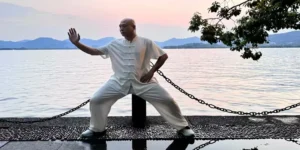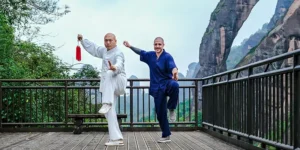The quest for holistic well-being often leads people to explore ancient mind-body practices. Two methods stand out: Tai Chi and Yoga. Both offer great benefits for physical health, mental clarity, and emotional balance, leading many to ask, “Tai Chi vs. Yoga—which one is best for me?”
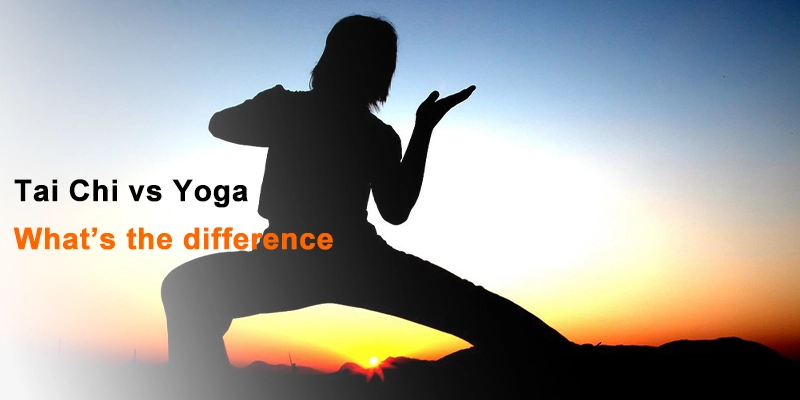
Whether it is Indian yoga or Chinese Tai Chi, long-term practice can improve flexibility, balance and alleviate sub-health problems. Understanding the differences between what is Tai Chi vs. yoga is crucial for making a clever decision. Let’s know more about tai chi and yoga.
Tai Chi And Yoga Defining
What is Tai Chi? Tai Chi quan is an internal Chinese martial art; now we practice it for health and meditation. It involves a series of slow, graceful, continuous movements with deep, diaphragmatic breathing and focused mental attention. Rooted in Taoist philosophy, it focuses on Yin and Yang balance, flowing energy, and mindful movement. Movements are generally standing, shifting weight fluidly between legs.
What is yoga? Originating in ancient India, yoga is a system that contains physical postures (Asanas), breathing techniques (Pranayama), meditation (Dhyana), ethical principles, and more. Western practice often focuses heavily on the physical asanas, which range from gentle stretches and restorative poses to demanding strength and balance postures. Yoga aims to combine mind, body, and spirit, promoting flexibility, strength, and inner peace. Poses can be done standing, seated, lying down, or inverted.
Tai Chi And Yoga Keys
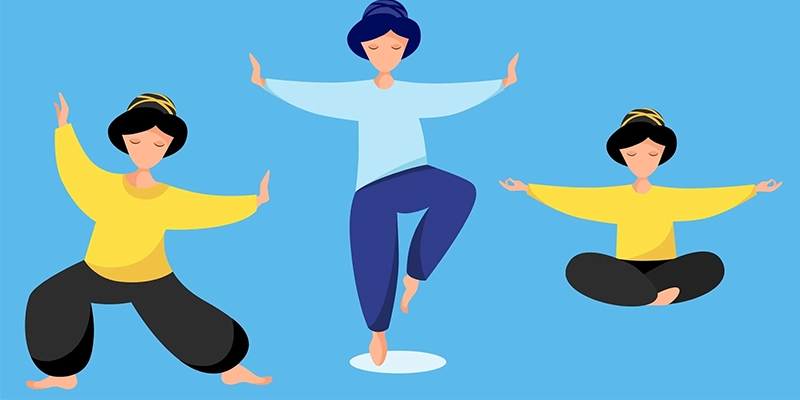
While both focus on mind-body connection, their approaches differ:
| Element | Tai Chi | Yoga |
|---|---|---|
| Movement | Continuous, flowing sequences; slow, circular motions; always weight-bearing on feet | Static holds (asanas); transitions between poses; includes inversions & floor work |
| Breath | Natural, deep abdominal breathing synchronized with movement | Specific techniques (Pranayama); often linked to movement or held poses |
| Mental Focus | Internal awareness of movement, balance, and energy flow | Varies (breath, body sensation, drishti point, meditation) |
| Physical Demand | Gentle on joints; low impact; emphasizes balance & leg strength | Ranges from very gentle to highly demanding; flexibility often key |
Benefits of Tai Chi And Yoga
Understanding the benefits of Tai Chi vs Yoga helps target your needs:
- Stress Reduction and Mental Clarity: Both. Tai Chi’s flowing motion acts as a moving meditation, calming the nervous system. Yoga uses breathwork and focused attention to achieve similar states. It’s excellent for relieving modern stress.
- Balance and Fall Prevention: Tai Chi’s constant weight shifting and rooting significantly improve proprioception and stability, making it highly good for seniors. Yoga also improves balance through standing poses but may involve more static moves.
- Flexibility: Yoga is best for flexibility. Many asanas are explicitly designed to stretch muscles and increase range of motion throughout the body. Tai Chi improves flexibility, especially in the hips and legs, but it’s often a secondary benefit to balance and flow.
- Strength: Both build strength, but differently. Yoga often builds more static strength holding poses and can target specific muscle groups intensely. Tai Chi builds functional leg and core strength through continuous, controlled weight-bearing movements in low stances.
- Cardiovascular Health: Both offer mild cardiovascular benefits, especially in more dynamic styles (e.g., Vinyasa Flow Yoga, faster Tai Chi forms). Neither is a substitute for dedicated aerobic exercise like running or swimming.
How To Choose Tai Chi or Yoga?
Tai Chi or Yoga? It depends on your exercise goals.
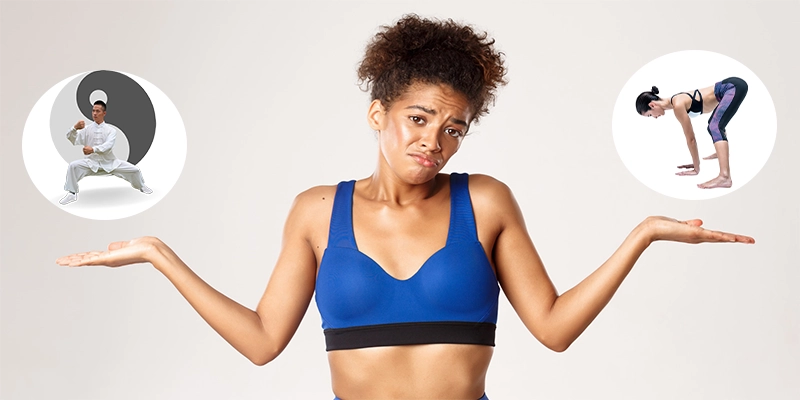
Tai Chi vs Yoga for Anxiety: Both are excellent. Tai Chi meditative motion can be deeply calming for your overactive mind. Yoga’s combination of physical release, breath control, and meditation is also obvious. Try both to see which style fits more with your anxiety patterns.
Tai Chi vs Yoga for Back Pain: Both can be beneficial with proper exercise. Yoga has poses specifically targeting back strength and flexibility. Tai Chi improves core strength, posture, and body mechanics through gentle movement and is often recommended for its safety. Crucially, consult doctor or physical therapist and inform your instructor about your pain.
Tai Chi vs Yoga for Flexibility: Yoga generally provides more targeted and deeper static stretching. Tai Chi improves dynamic flexibility and joint mobility. For significant gains in static flexibility, yoga wins, but tai chi enhances functional, everyday mobility.
Tai Chi vs Yoga for Seniors: Both are fantastic and safe. “Tai chi vs yoga for seniors” is a common search for good reason. Tai Chi is often highlighted for its unparalleled effectiveness in improving balance and preventing falls, a major concern for older adults. Its gentle, continuous movement is very accessible. Gentle yoga styles like chair yoga, restorative, or yin are also superb for flexibility, strength, and relaxation. The best choice depends on your body and interests.
Tai Chi vs Yoga for Weight Loss: Neither is a high-calorie burner like intense cardio. However, more vigorous Vinyasa, Ashtanga, and Power Yoga will burn more calories than gentle yoga or Tai Chi. Tai Chi improves metabolism and body awareness, which can support healthier choices. So, neither is suitable for people who want to lose weight.
Tai Chi vs Yoga vs Pilates vs Qigong:
- Pilates: Focuses intensely on core strength, stability, and controlled movement, often using specialized equipment. Less emphasis on meditation/spirituality than yoga or Tai Chi.
- Qigong: A broader Chinese practice focused solely on cultivating Qi through simple, repetitive movements, breathing, and meditation. Tai Chi is considered a sophisticated form of Qigong. Qigong exercises are often simpler and shorter than Tai Chi forms.
What People Say: Tai Chi vs Yoga Reddit
Scouring forums like Reddit (“tai chi vs yoga reddit”) reveals common themes:
- Many find Tai Chi exceptionally calming and grounding.
- Others prefer yoga for its physical challenge and deeper stretches.
- Seniors often report feeling more stable and confident after starting Tai Chi.
- People with joint pain frequently praise Tai Chi’s gentle nature.
- Yoga practitioners love the variety of styles and the deep mind-body connection.
A common suggestion: Try both! Personal experience is the best guide!
Best Practice is the One You Enjoy
Ultimately, the “yoga vs tai chi benefits” debate has no winner. Both offer incredible paths to better physical health, mental clarity, and inner peace. The most important factor is finding a practice you connect with and will stick to consistently.

